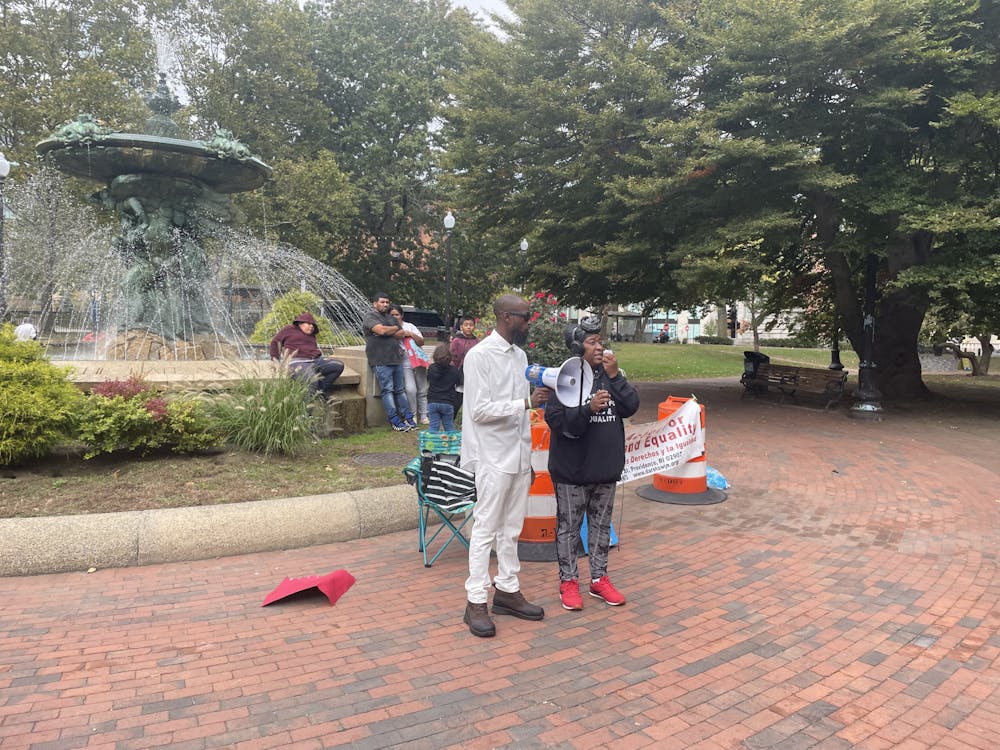Protesters gathered in Burnside Park in downtown Providence Saturday afternoon to call for action on evictions, homelessness and the housing crisis, all of which have been exacerbated by the COVID-19 pandemic.
The protest was organized by the Rhode Island-based activist group Direct Action for Rights and Equality in support of the local families evicted from their homes during the pandemic.
Terri Wright, the main organizer of the protest, called on Rhode Island and Providence leadership to “provide housing for all” and to “stop evictions,” drawing applause and cheers from the crowd of around 40 people.
Many members of the crowd wore signs ranging from “Housing is a Human Right” to “Stop Evictions, Save Lives.”
Loud chants of “What do we want? Housing! When do we want it? Now!” echoed through the park. Afterwards, various individuals, including DARE members and people who have been affected by the housing crisis, gave testimonials about their experiences to the crowd.
Wright spoke out against high housing prices, demanding that “everybody should have housing who wants housing,” leading to more applause and chants.
Brenda Taylor, a committee representative for DARE, called for the city to take prompt action, adding that whether the city should choose to “get more affordable housing built, or renovate the current housing here, we need housing and we need it now.”
“We want everybody to be home in their own place,” Taylor said, referencing the danger homelessness poses, especially during a pandemic. She said that it is common for families who have been evicted to stay with other families, potentially facilitating the spread of COVID-19.
Taylor also framed housing as a fundamental human rights issue: “Bees have hives, and bears have dens. Why can’t all humans have homes?” She went on to criticize the “astronomical” rent prices in the statte. “We need to get it together as humans. ... People are entitled to life.”
Sucely Murillo, who was evicted twice, said she is again facing eviction after paying rent in her current apartment for six months.
“People are being hurt. We need to keep putting (landlords) on the spot and putting pressure on them, just like they put pressure on me to pay rent,” Murillo said. “This is an abuse of power.”
Wright said that although homelessness has been a persistent problem in the past, shelter space was not at as scarce as it currently is. The waitlist for shelter in Rhode Island now has 1,000 people on it, The Boston Globe recently reported. Wright said that shelters offer no privacy, and beds in many shelters have to be reserved beforehand through the Rhode Island Coordinated Entry System.
Wright implored Governor Dan McKee to enact an eviction moratorium “to protect Rhode Island” and suggested the governor declare a State of Emergency for homelessness.
The wave of evictions prompted by pandemic-related economic hardship was put on hold by a series of eviction moratoriums from the federal government, the last of which was struck down by the U.S. Supreme Court in late August. The moratorium had effectively delayed impending evictions for millions of Americans, according to an analysis from Princeton’s Eviction Lab, which studies evictions and housing policy. But since the latest moratorium was struck down, evictions have resumed.
Wright said that affordable housing for no-income and low-income families is crucial to helping people recover from COVID-19. She said that there has been “no political push,” so it is up to the people of Providence to advoTcate for “the people’s agenda.”
“What if we could bring this to the governor’s or mayor’s door?” Wright said. “This is the people’s agenda,” she repeated. “This is what unity looks like. We have to keep coming out, because pressure bursts pipes. We are not going to stop until we can get housing for all.”
Among the crowd were a group of University students with Housing Opportunities for People Everywhere, including Rocket Drew ’22 and Gabe Mernoff ’22.5.
“We conduct nighttime street outreach (with HOPE), so we are intimately familiar with the devastation that evictions can bring to people and the serious, life-threatening challenges that homelessness presents,” Drew told The Herald. “We think the state is not doing nearly enough.”
Drew added that “we have somewhat of a reparative obligation to be here as Brown students, in light of Brown’s history of gentrification and displacement in the area.” Students seeking off-campus housing on College Hill have contributed to forcing out local residents and straining already-reduced housing stock in the past, The Herald previously reported.
“In the College Hill bubble, it’s so easy to pretend that these issues don’t exist,” Drew said. “When you’re familiar with” the issues, he said, “you can’t just ignore it.”
Mernoff, a Rhode Island native, said that “having access to a home is so intimately tied to other issues, such as health and social determinants of health. I’ve never understood why we have such obvious inequality between (College Hill) and here in downtown.”
The motivation behind the protest was the current lack of an eviction moratorium, Wright told The Herald after the protest. She said that DARE “is helping with evictions. We have a center for justice” to help with low-income and no-income families. “We are also working for rent stabilization,” she said, “so that our low-income tenants don’t get priced out.”
“It’s time to think about Rhode Island at the grassroots level, and not on the political level,” Wright said.
Echoing the repeated chants of protesters, she added, “Stop evictions, save lives.”





